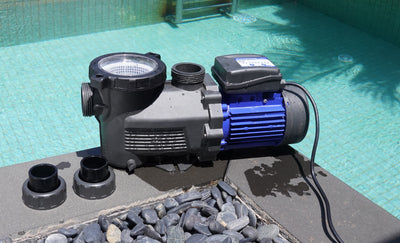The Truth About Nitrates in Your Pool: What You Need to Know
Nitrates in your pool? Panic mode, right? Many pool owners may have heard that nitrates are a serious problem that requires draining the pool and starting over. But before you go down that path, let’s take a step back and understand what nitrates are, where they come from, and whether you really need to worry about them.
At AQUASTRONG, we focus on providing effective solutions to keep your pool clean and safe without unnecessary stress. Let's dive into what nitrates are, how they affect your pool, and how to deal with them effectively.
What Are Nitrates?
Nitrates are naturally occurring compounds formed when nitrogen in the environment combines with oxygen. They are commonly found in fertilizers, manure, and even wastewater from septic systems. Nitrates are essential for plant growth, which is why they’re often used in fertilizers. While they’re beneficial for your garden, they can cause trouble for your pool by providing food for algae.
Where Do Nitrates Come From?
Nitrates can enter your pool in several ways, often without you even noticing. Here are the main sources:
- Runoff from Fertilizers: If you use lawn fertilizers, the nitrates in these products can wash into your pool, especially when it rains.
- Septic Systems and Wells: For homes using septic systems or well water, nitrates can seep into the ground and into your pool, contaminating the water.
- Animal Waste: Pets, wildlife, and even local birds can introduce nitrates into your pool through waste. While you may clean up after your pets, some residues can remain, especially if your yard is fertilized.
- Human Waste and Products: Sweat, oils, cosmetics, and personal care products can contribute small amounts of nitrates to your pool. These compounds, while not a large concern on their own, can add up over time and support algae growth.
Should You Worry About Nitrates in Your Pool?
The presence of nitrates in your pool isn’t an immediate cause for concern. While nitrates do serve as food for algae, you don’t need to go to extremes to remove them. Just like phosphates, which are another algae food source, it’s almost impossible to completely eliminate nitrates from your pool, and doing so won’t solve the underlying problem.
Rather than obsessing over nitrate levels, it's essential to focus on maintaining a clean and properly sanitized pool. Keeping your pool water balanced and clear will go a long way in preventing algae growth, regardless of the nitrates present.
How to Manage Nitrates in Your Pool
The real question isn’t how to remove nitrates, but how to prevent them from causing algae issues. Here's how you can manage nitrates in your pool effectively:
1. Focus on Prevention
The best way to deal with nitrates is to prevent algae from growing in the first place. Algae thrive in pools where the water is dirty and improperly sanitized. Ensure that your pool is cleaned regularly, and that you’re maintaining the correct sanitizer levels to prevent algae growth.
- Maintain Proper Chlorine Levels: Keep your pool’s chlorine (or chosen sanitizer) levels within the recommended range. Regular testing and adjusting will help keep algae at bay.
- Shock Your Pool Regularly: Shocking your pool helps to destroy organic contaminants, including those that may contribute to algae growth. Shock your pool at least once a week or more often if you have multiple nitrate sources around the pool.
- Test Water Frequently: Use a reliable pool water testing kit to check for pH, chlorine, and alkalinity levels. Regular testing helps you spot potential issues before they become a problem.
2. Keep Your Pool Clean
Regular cleaning prevents debris from building up in your pool and turning into a food source for algae. This includes skimming the surface, brushing walls, and vacuuming the pool floor. Don't forget to clean the pool filter regularly as well to ensure water circulates efficiently.
3. Use Algaecides If Necessary
If you notice algae starting to develop in your pool, even with regular maintenance, you may need to use an algaecide. There are many types of algaecides available, so it’s important to choose the right one based on the type of algae you're dealing with. Follow the instructions on the product to apply it correctly.
4. Keep Surrounding Areas Clean
Minimize the chance of nitrate contamination by cleaning your yard regularly. Ensure that any fertilizers are applied correctly and avoid over-fertilizing your plants. If you have pets, be diligent about cleaning up after them, especially in areas close to the pool. Cover your pool during rainstorms to prevent runoff from depositing contaminants in the water.
Conclusion: Keep Your Focus on Pool Care, Not Nitrates
Instead of stressing about the nitrates in your pool, focus on the real solution: keeping your pool clean, properly sanitized, and well-maintained. The goal isn’t to remove nitrates completely (which is nearly impossible), but to prevent algae from using them as food. With the right pool care routine, nitrates won’t be a major problem.
At AQUASTRONG, we offer a range of products designed to help you keep your pool in top condition, from pool sanitizers to cleaners and testing equipment. Maintaining a clean pool is simple when you follow a regular maintenance schedule and use high-quality products designed for easy care.
By focusing on prevention and proper maintenance, you can enjoy a crystal-clear pool without worrying about nitrates. Keep your water clean, and your pool will stay algae-free and ready for a swim at any time!

